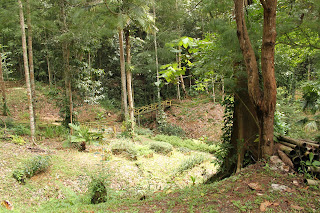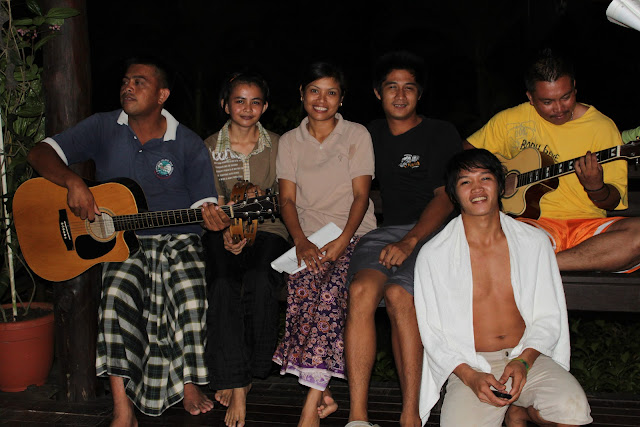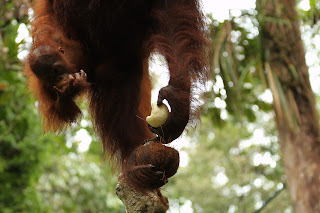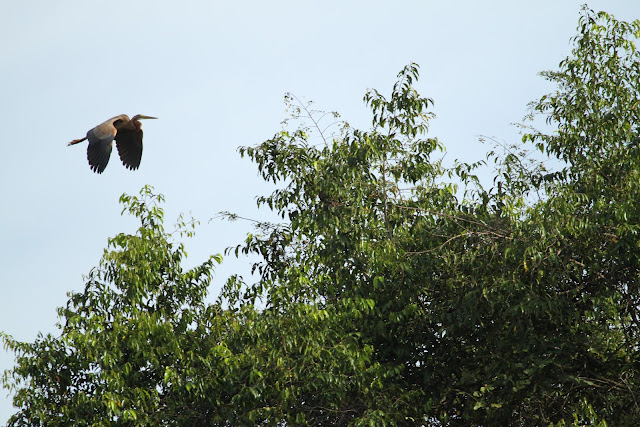Borneo.
The name itself conjures up wild jungle, animals of all hues, danger, adventure, grit.
And so it is.
It is also poignant ... stirring, uplifting yet painful. The fate of some of nature's greatest and gentlest creatures rests in our hands.
Borneo would blow my mind.
My long trip to South East Asia would cover much ground over several weeks. But my heart was beating for Borneo long before I ever caught a flight.

I had also heard whispers about a unique species of elephant, sometimes seen in the jungles of Borneo - the Bornean Pygmy Elephant. Would I be so lucky as to catch sight of these elusive pachyderms?
I flew in from mainland Malaysia to Borneo, an island shared by Malaysia, Indonesia and tiny Brunei. Borneo is the third largest island in the world, after Greenland and New Guinea. The Bornean rainforest is apparently the oldest rainforest in the world at 130 million years, about 70 million years older than the Amazon in Brazil.
From the air, I could immediately see why there's concern about Borneo, and the future of its endemic species of orangutans, clouded leopards, pygmy elephants, monkeys, and all manner of giant birds. Rainforest has been stripped to make way for palm oil plantations.
Palm oil is a cash crop here. According to nature conservation organizations, palm oil is so ubiquitous in consumer goods .. from soaps and ice cream to cosmetics and biofuels .. that its cultivation in Malaysia and Indonesia has resulted in massive rainforest destruction and the threatened extinction of wildlife, including orangutans.
Semengohh, Sarawak
Upon landing at Kuching airport in Sarawak, which is western Malaysian Borneo, I could barely contain my excitement. With nary a concern for hotel or hostel accommodation or food, I caught a taxi straight for Semenggoh Wildlife Rehabilitation.

And there she was, in the rain, high atop a tree...shielding herself with a branch. Tears welled up in my eyes. After years of dreaming, I had seen my first Orangutan.
As the rain let up, the orangutans came out, sometimes as close as twelve feet, but always under the watchful eye of the park rangers who love their wards dearly.
According to research, Orangutans are the only great apes to dwell primarily in trees.
In the wild, they can live 35 to 45 years, and in captivity up to 60. Females usually give birth every eight years, the longest inter birth interval among mammals.
While most DNA studies indicate that chimps are the closest relatives to humans, other research is underway which is attempting to show that the orangutan might be even closer related to us.
Once widely spread over Southeast Asia, only two populations of orangutans remain in the wild, in Borneo and Sumatra. The International Union for the Conservation of Nature mentions that some 50,000 orangutans live in Borneo, while in Sumatra deforestation and hunting has reduced the great apes to about 7,000 individuals.
When visitors get too close to these placid primates, it only takes one sighting of the dominant male Ritchie for folks to beat a hasty retreat. With his elevated cheeks, Ritchie cuts quite an imposing figure indeed.

Feeding time brings great joy to the orangutans, and to gasping humans enthralled by the sight of their copper toned cousins eating fruit and banging open coconuts on tree trunks.
Is it better to come see orangutans in this protected - yet wild - forest where they have been introduced after being rescued from illegal captivity and when orphaned at the hands of poachers and loggers, or to go looking for them in the wild in various parts of Borneo? It depends ... there's not much wild left for these and other species. And would rescued orangutans be in danger again if released into the wild?
Kuching, Sarawak
A mix of the old ... and the new.
 |
|
There are plenty of accommodation choices in Kuching. As a backpacker, the Nomad was a great place to stay.... owner Chris, of the Iban people, and his friends make this place a memorable party. When he is not playing guitar, Chris might take you to see the longhouses of his people, deep in the forests of Borneo.
 |
|
I wouldn't have time for the Bako National Park on this trip, to see proboscis monkeys, but I was soon to see them, and other mind bending creatures in the wild. From Kuching I would fly to Borneo's eastern state of Sabah, and was I in for a wildlife adventure of my life.
Kinabatangan River, Sabah
Stretching 560km from southwest Sabah to the Sulu Sea in the east, the Kinabatangan River is one of the world's premiere ecosystems, and home arguably to the largest concentration of wildlife in south east Asia.
I flew from Kuching to Sabah's city of Kota Kinabalu and then to Sandakan on inexpensive and excellent AirAsia flights. I was short on time in Sabah, so once in Sandakan, I took a taxi straight to a tour company's office, who booked and drove me to their Kinabatangan River Lodge. You should plan your trip so you're not flying by the seat of your pants like I was, and set up a longer stay with either your tour outfit or with homestays in the small village of Sukau.
Even so, I was to be very fortunate, and about to be rewarded for my visit.
 |
| Proboscis Monkeys are quite the unusual simian, and easy to spot all along the river forests |
 |
| Birds of all sizes and colors make for thrilling photography |
 |
| She gave me her best camera moment. Thank you. |
 |
| A monitor lizard...these guys are pretty huge - enlarge the picture to get a sense |
 |
| A Hornbill ... many bird enthusiasts come here to spot the amazing range of hornbills |
 |
| I had told my guide friends Rosa and Mohammad, that if I saw the Bornean Pygmy Elephants my heart could rest ~ |
 |
| We got as close as 14 feet to the little big guys. Almost 20 of them. |
 |
| Such a joy to see these massive birds, in great numbers |
 |
| The Kinabatangan River is croc infested. No swimming here. |
 |
| So lucky to get this still beauty of a kingfisher in the dead of night during a boat ride through the forests |
 |
| Monitor lizards need their beauty sleep too |
 |
| A mother and child sleeping high up in a jungle canopy at night |
 |
| An owl with a kill during the day. Expand the picture to see its curious eye. |
 |
| So gentle. |
 |
| On the Oxbow Lake |
 |
| This Baby was very playful, and adult females doted on her |
 |
| Joy |
Tourism provides employment. I noticed that visitors at the lodge did not make an attempt to befriend the locals... and I was not surprised as I see this on all my travels. They were missing out. My Bornean friends were a delight, and one of the biggest reasons I will return to Borneo ... to understand the culture better.
 |
| New friends who were my guides from S.I. Kinabatangan Lodge, and who play hauntingly beautiful Bornean music |

In reality, the Kinabatangan River now houses secondary and not primary forest. Wildlife has to make do with what's left of any forest, since the palm oil plantations are only 150 yards from the edge of the river.
 |
|
In my limited understanding of life, I think that our self indulgence and our media fixation - all of us who live in cities spread around the world divorced from any real relationship with nature - drives consumerism, which drives corporations to seek out natural resources anywhere on the planet. And when someone is willing to buy, someone is willing to sell. We can't point a finger at Borneo. When a guy has to pay his house mortgage in the US or Europe or anywhere .. whether he's a workerbee or a CEO .. he will sell himself to a corporation that will globally source and package a product for money.
So my visit to Borneo was poignant. I got to see these great primates, and other amazing creatures that inhabit this earth, along with a glimpse of how we're all complicit in the destruction of species that don't understand shampoos, cereals, and a world without trees. Let's think about them the next time we fuss over our physical beauty or our need to impress our mates and peers with things.
I saw these words in my hostel in Kuching ~











































Hello. Where did you see the elephants in Borneo?
ReplyDeleteCongratulations for the photos!!